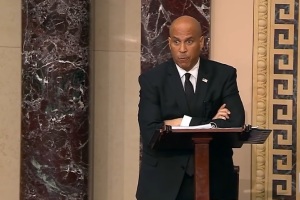Supreme Court rejects W.Va.'s appeal on law barring boys from competing in girls’ sports

The United States Supreme Court has rejected a request from West Virginia to allow it to lift a block on a law prohibiting boys from competing in girls’ sports.
In an order issued Thursday, the high court denied an application to vacate a lower court injunction in the case of West Virginia v. B. P. J., thus allowing a trans-identified male athlete to compete on a girls’ middle school track team.
Justice Samuel Alito authored a dissent to the denial, being joined by Justice Clarence Thomas, objecting to the lack of stated reasons for why the injunction was allowed to remain in effect.
“I would grant the State’s application. Among other things, enforcement of the law at issue should not be forbidden by the federal courts without any explanation,” wrote Alito.
Alito admitted that it was “true that West Virginia allowed the District Court’s injunction to go unchallenged for nearly 18 months before seeking emergency relief” and that it was “a wise rule in general that a litigant whose claim of urgency is belied by its own conduct should not expect discretionary emergency relief from a court.”
“But in the circumstances present here—where a divided panel of a lower court has enjoined a duly enacted state law on an important subject without a word of explanation, notwithstanding that the District Court granted summary judgment to the State based on a fact-intensive record—the State is entitled to relief,” he continued.
In April 2021, the West Virginia Legislature passed House Bill 3293 — also known as the Save Women’s Sports Act — which, among other things, stops boys and men who identify as female from competing in sports designated for girls at the secondary and university levels.
Judge Joseph Goodwin, who was appointed by former President Bill Clinton, initially struck it down in July 2021, but then in January reversed his own decision and dissolved an injunction against the state law.
In February, a three-judge panel of the Fourth Circuit Court of Appeals ruled 2-1 to reinstate the block on the Act, which prompted West Virginia to appeal to the Supreme Court last month.
“The majority did not provide any legal or factual reasoning for its decision. Nor did it question the district court’s analysis or record review. Instead, it gave a one-sentence notice of the grant and entered an injunction on appeal,” noted the state’s request.
“That unreasoned order unjustifiably upsets the way that things traditionally work in school sports. For as long as schools have offered sports teams, it has been the ‘norm’ to designate student athletes to them by sex.”





























